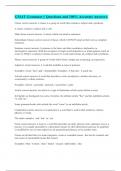GMAT Grammar || Questions and 100% Accurate Answers.
Clause correct answers A clause is a group of words that contains a subject and a predicate.
A clause contains a subject and a verb.
Main clause correct answers A clause which can stand as sentences.
Subordinate Clauses correct answers Clauses which CANNOT stand on their own as complete sentences.
Sentence correct answers A sentence is the basic unit that constitutes a declarative or interrogative statement. With the exception of single-word imperatives or interrogations (such as Look! or What?) a sentence contains at least two words and consists of a subject and a predicate.
Phrase correct answers A group of words which form a single unit a meaning; an expression
Adjective correct answers A word that modifies a noun or pronoun.
Examples: Good / bad / ugly / disreputable. Examples: A big man / A good one .
Adverb correct answers A word that describes a verb, an adjective, another adversary, or occasionally a whole sentence.
Examples: Slowly / generally / upwards / somewhere / quite
Article correct answers An article is a type of determiner which comes before a noun. In English we distinguish two sorts of articles, the definite article "the," and the indefinite articles
"a" and "an."
Some grammar-books also include the word "some" as an indefinite article.
Conjunction correct answers A conjunction is a word that is used to link sentences, clauses, phrases or words. The main examples : and / but / or / yet .
Noun correct answers A noun is a word that describes an entity (person, item, substance etc) or a process. It is usually preceded by a determiner (article or other determiner) and may be qualified or modified by one or more adjectives, by prepositional phrases, or by another noun. Nouns are divided into two main categories, count or countable nouns , that can be counted, and non-count or uncountable nouns that cannot. Examples: Man / woman / chair / basket / oxygen / philosophy / idea Countable Noun correct answers a noun like car, dog, idea, which can have a plural form and can
be used with the indefinite article a/an.
uncountable nouns correct answers are substances, concepts etc that we cannot divide into separate elements. We cannot "count" them. For example, we cannot count "milk". We can count "bottles of milk" or "litres of milk", but we cannot count "milk" itself.
Preposition correct answers A word that shows the relationship of a noun or pronoun to another word
A preposition is a short functional word that serves to relate two other words in terms of space, time, manner or other relation. Prepositions are essentially used to introduce a prepositional phrase (like in the beginning), or to inflect the meaning of a verb (like to come in).
Examples: in / on / under / against / after / with / by
prepositional phrase correct answers A group of words that begins with a preposition and ends with a noun or pronoun.
Pronoun correct answers A word that takes the place of a noun.
A pronoun is a (usually) short word that allows a speaker or writer to refer back to an already-
mentioned (or implied) noun, or to a statement, without repeating it. The main groups of pronouns are personal pronouns ( I you he she it one we they... and their object forms or possessive forms, me, her ... and mine, hers), demonstrative pronouns (this, that etc) and relative and interrogative pronouns (who, which etc.).
Personal Pronoun correct answers refers to the one speaking, the one spoken to, or the one spoken about
Demonstrative Pronoun correct answers There are four demonstrative pronouns in English, two in the singular, and two in the plural; they indicate either proximity (this, these), or distance (that,
those). This, these, that, those
Relative Pronoun correct answers In their most common usage, relative pronouns introduce a relative clause - either as a subject (who, which, that) , or as a direct object (whom, which, that), or in the context of a prepositional phrase (to whom, with which, by which, etc) or
They are called "relative" because in a declarative sentence, they relate to a noun that has normally just been mentioned.
link for examples: https://linguapress.com/grammar/relative-pronouns.htm
Nominal Relative Pronouns correct answers Relative Adjectives correct answers Relative Adverb correct answers An adverb that starts an adjective clause. As relative pronouns, they are used to replace a longer phrase that would include a standard relative pronoun such as whom or which.
You can memorize them: where, why, when.
→ I can remember a time when I could eat four hamburgers.
Verb correct answers A word that describes an action or state of meaning.
Dynamic Verbs correct answers A verb that expresses an action rather than a state
Examples: go / become / sit down / move
Static Verbs correct answers Describes a condition or state of being
examples: be / like /know
Subject correct answers he subject is the main actor or the main topic of a sentence. In a basic declarative sentence, the subject comes before the verb. The subject may be just a single pronoun
or noun, such as He or The cat ; but in many sentences it is may be quite a bit more, including adjectives, prepositional phrases, relative clauses or more. In this example, all the words before the "/" make up the subject
Example: The old man in the red shirt who's / talking too loudly is my uncle.
Predicate correct answers Everything in a sentence that is not the subject. The predicate includes the verb, or verbs, plus any other elements that may be present, notably objects or adverb phrases.
In a normal affirmative sentence, it follows the subject. It must contain a verb.




